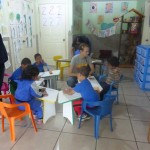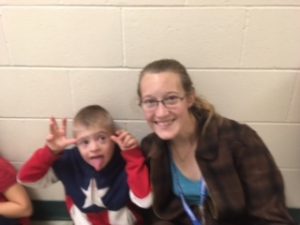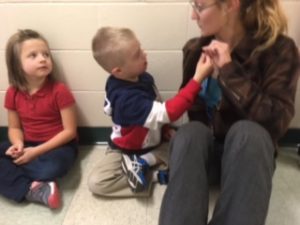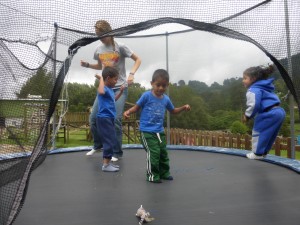Diversity
I believe that every student has the ability to develop their skills and abilities. No student was born with a distinct set of things that they can and cannot do, rather I believe that every student has the ability to overcome challenges and grow as a learner.
I believe that it is important to connect curriculum to students every-day lives, because this will integrate classroom learning with out-of-school experiences and knowledge of life inside the community and carry learning further for students of any cultural background.
The summer of 2015 I received the amazing opportunity to go on a mission tip with my home congregation to  Guatemala City, Guatemala. We were to spend a week in Guatemala at Fundaninos school and orphanage teaching vacation bible school and repainting the outside of their school building.
Guatemala City, Guatemala. We were to spend a week in Guatemala at Fundaninos school and orphanage teaching vacation bible school and repainting the outside of their school building.
One night while we were eating supper at the orphanage I had the opportunity to visit with the principal of the school. We talked about my plans to attended Concordia the following year and study Early Childhood education. The next morning at breakfast the princi pal came up to me saying her preschool teacher had just called in sick and she asked me to fill in for the day. So, I spend the day teaching and playing with eight preschoolers in Guatemala. These students new very little English, but luckily I new enough Spanish to be able to communicate the lesson. Experiencing this new culture in a classroom setting really opened my eyes. Before this I had felt very comfortable in a classroom of preschoolers and really thought I had it under control. This experience taught me how much I had still had to learn and how much of that I could learn from the students. They taught me to take off my shoes when entering the book area, After glaring and me and then looking at their removed shoes when I walked in with shoes still on. They also taught me the importance of beginning each day with a prayer, even if I didn’t actually know the words. It was very humbling to learn that I could be the teacher and have a place of authority but still be very much a student of their classroom culture.
pal came up to me saying her preschool teacher had just called in sick and she asked me to fill in for the day. So, I spend the day teaching and playing with eight preschoolers in Guatemala. These students new very little English, but luckily I new enough Spanish to be able to communicate the lesson. Experiencing this new culture in a classroom setting really opened my eyes. Before this I had felt very comfortable in a classroom of preschoolers and really thought I had it under control. This experience taught me how much I had still had to learn and how much of that I could learn from the students. They taught me to take off my shoes when entering the book area, After glaring and me and then looking at their removed shoes when I walked in with shoes still on. They also taught me the importance of beginning each day with a prayer, even if I didn’t actually know the words. It was very humbling to learn that I could be the teacher and have a place of authority but still be very much a student of their classroom culture.
I believe that challenges and set backs are important to learning, because these things teach the importance of perseverance. My classroom will aid in the development of grit, because students will have a passion for learning and knowledge that their ability to push through failures make them stronger.
For field experience for my Psychology of Exceptionality class I had the pleasure of working with Benjamin at Saint Vincent de Paul School in Seward. Benjamin is a six year old Kindergarten student with Down Syndrome. Benjamin has been i ncluded into a classroom with 17 of his peers. I worked in this classroom on Tuesdays and Thursdays during science, PE, and Music time. The first day I went I had no idea what I was doing. Benjamin hit another girl in the class and tried to strangle a little boy twice during PE. As I continued to go and work with Benjamin I learned that PE had been a problem for Benjamin from the beginning of the year. There were two boys in the class that were much smaller than him and he would go from playing nicely to trying to strangle one of these two boys. Helping Benjamin to control this became my mission during PE time.
ncluded into a classroom with 17 of his peers. I worked in this classroom on Tuesdays and Thursdays during science, PE, and Music time. The first day I went I had no idea what I was doing. Benjamin hit another girl in the class and tried to strangle a little boy twice during PE. As I continued to go and work with Benjamin I learned that PE had been a problem for Benjamin from the beginning of the year. There were two boys in the class that were much smaller than him and he would go from playing nicely to trying to strangle one of these two boys. Helping Benjamin to control this became my mission during PE time.
I started running around with him when then played games and made sure I was always in-between him and the other boys, however, it would take only a second of me falling behind for him to try and strangle them again. After having a conversation with Professor Deterding to see if she had any helpful strategies; I encouraged him to gives the boys a high five every time that he saw them at PE. This was an immense help and soon I could stay further away at PE and simply remind him to give high fives. By the end of my time working with Benjamin it had been over a month since he had tried to strangle or hit anyone at PE. It was such a blessing to watch him run and play with the other kids and see how much they included him without needing any extra guidance.
however, it would take only a second of me falling behind for him to try and strangle them again. After having a conversation with Professor Deterding to see if she had any helpful strategies; I encouraged him to gives the boys a high five every time that he saw them at PE. This was an immense help and soon I could stay further away at PE and simply remind him to give high fives. By the end of my time working with Benjamin it had been over a month since he had tried to strangle or hit anyone at PE. It was such a blessing to watch him run and play with the other kids and see how much they included him without needing any extra guidance.
This was an amazing experience for me. I learned so much by helping in this classroom. I observed some of the strategies that Mrs. Crane the classroom teacher used to include Benjamin while making sure the rest of the class did not get left behind. Many of these strategies are things that I hope to use in my future classroom. One that I want to keep in mind is having a certain place for each student to stand in line and a certain place for each student to sit at circle time. This was needed for Benjamin but not the other children, but having other kids do it helped to not make him feel singled out. It was amazing how incredibly bright Benjamin was. He could read very well and memorized songs like a pro. He simply needed someone to help him stay on task and focus on having appropriate social reactions with the other kids. I know that Benjamin has a very bright future ahead of him and I am so glad that I got to spend a semester learning from him.
I believe in setting high but achievable expectations for my students and communicating my belief in their ability to succeed through my words and actions, because these expectations will foster academic and personal resilience.
Spring Semester 2017 I had the opportunity to work with 5 of my peers to put on Club EDEFY on Monday nights. Club EDEFY in a program put on by People’s City Mission in Lincoln, Nebraska. This was a time for children age 5-13 to spend some time away from their parents and to listen to a lesson, play games, do crafts, and learn songs. This experience is one that really helped me reflect on myself and my own response to diversity. I admit that I went into this experience with a lot of bias. I believed that the children would be terrible, not listen to anything I said, and make me want to never come back. I honestly believed that my job was to be the perfect disciplinarian. I stayed far away from talking to the children personally and saw myself as an authority figure who’s job was to get them to be good. As time went on I realized that I was going about things all wrong. I started to let loose and just have fun with the kids. One day I was having fun playing “boss” with one of the young girls. She invited me into her office and had a talk with me about how she wanted to get back at another girl for being a bully. We ended having an amazing talk about how if we bully back the cycle will just continue and nothing would ever get better. Then we talked about how she could change the cycle, about 10 minutes later she invited the other girl over to her “office” and explained everything that I had just told her. My heart absolutely melted in that moment. I realized that the times that I thought it was my job to be a miracle worker and “fix” the kids, I was doing absolutely nothing for them, but when I simply had fun and talked when they wanted to I became a good influence and helped them make themselves better. This experience taught me a lot about myself as a disciplinarian. I’ve learned that students are more likely to follow rules that they feel like they have a part in and understand. I hope to use this in my furutre classroom by allowing my students to help me make the rules at the beginning of the year and allowing them to take responsibility for following those rules.


